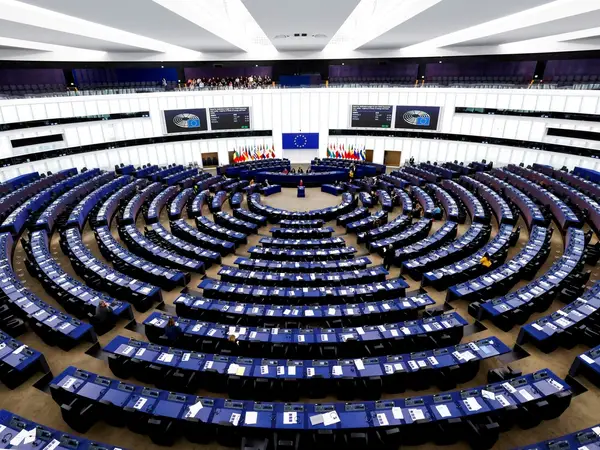While many Iranians welcomed the European Parliament’s resolution that calls on EU to list the Revolutionary Guard as a terrorist group, regime officials have threatened to respond.
After the European Parliament overwhelmingly passed the resolution Thursday that may eventually lead to the designation of the IRGC, people on social media started to congratulate each other, describing it as yet another victory for their revolt against the clerical regime.
Since the beginning of the current wave of antigovernment protests ignited by a Iranian young woman – Mahsa Amini – the Iran’s government is becoming more isolated in the international community. So far, the Islamic Republic was voted out from the United Nations Commission on the Status of Women (CSW) for policies contrary to the rights of women and girls in December. Another step was by the Geneva-based UN Human Rights Council’s decision on November 24 to launch an independent investigation into the regime’s deadly repression of protests that has killed around 500 civilians, including about 60 children. Several rounds of sanctions by the European Union, the US, Canada and others also targeted officials and entities involved in the crackdown.
According to social media videos, people in some Kurdish cities, including Saqqez – the hometown of Amini -- and Mahabad, came to the streets and rejoiced with fireworks following the approval of the resolution.
Videos sent to Iran International from different cities such as Qom – home to Iran’s biggest seminary -- and the southern city of Bandar Abbas show people distributing candies to celebrate the decision. In one video, someone said that they are watching the European Parliament’s session live on Iran International TV, adding that it is more exciting than the World Cup matches.
Meanwhile, Islamic Republic’s officials, who had started threatening Europe even before the vote, have intensified their rhetoric against European countries over the decision.
Foreign Ministry spokesman Nasser Kanaani said the reason for the designation of IRGC as a terrorist organization is that Europe is infuriated over the IRGC’s leading role in the fight against terrorism. “The reason behind the anger of the ‘global club of terrorists’ is crystal clear. The IRGC is the world’s largest counter-terrorism institution,” he wrote in a tweet on Friday.”
In a statement on Friday, the Army condemned the move, claiming that it exposed the enemies’ grudge against the Islamic establishment in Iran. “The measure of the European Parliament, which claims to be fighting terrorism, against an anti-terrorist institution is out of their desperation and failure in supporting recent riots in Iran,” read the statement.
Hardliner Iranian lawmaker Mohammad Esmail Kowsari, himself a former IRGC commander, said on Friday, "One should ask where the IRGC has committed terrorist acts. They conspired to overthrow the Islamic Republic and the IRGC foiled it." Vowing that the parliament will announce its retaliatory measures on Sunday, he asked, “What part of the IRGC is a terrorist group?”
Criticizing the motion, Speaker of Iran’s parliament, Mohammad Bagher Ghalibaf, said that “If the European Union makes such a decision and lists the Guards as a terrorist organization, it means that the European Union acts as a supporter of terrorism, because the IRGC is the biggest and most successful anti-terrorist entity.”
The whole argument of the Islamic Republic in defense of the IRGC – which has armed proxies in many countries across the region – is its limited role in the battle against the ISIS. But in fact, IRGC was building its own Shiite militant proxy network and to an extent fought against the Sunni extremist group.
The European Parliament cannot decide to designate the IRGC because the terrorists list is not a list decided by the Parliament itself but by the EU Council, comprised of ministers of each EU country. If the resolution garners enough support, it is then upon the national governments of the EU member states to make the final decision. The listing of the IRGC must have a unanimous vote by all 27 EU members in the EU Council.
